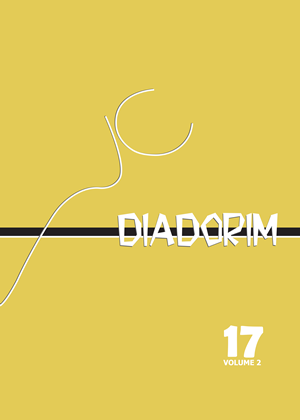INTRINSIC FUNDAMENTAL FREQUENCY RELATED TO LEXICAL STRESS IN THE SPEECH OF PEOPLE WITH PARKINSON'S DISEASE
DOI:
https://doi.org/10.35520/diadorim.2015.v17n2a4073Abstract
Intrinsic fundamental frequency (IF0) refers to a systematic difference in f0 between vowels of different heights in a similar phonetic context: high vowels tend to have higher f0 than lower vowels. Various hypotheses as to the cause of IF0 have been raised, differing mainly on the nature they attribute to the phenomenon: whether it is passive (automatic), resulting from articulatory movements that reach these segments without intending IF0 specifically; or active (controlled), deliberately generated due to reasons of perception or compensatory processes. In this article, we hope to contribute to the debate with f0 data obtained from patients suffering from Parkinson's disease (PD). 631 / a, i / vowels were analysed from recordings of an extract of text read aloud. As a result, IF0 was observed not only in participants from the control group, but also from the PD group, and the trends for participants with dysarthria were no different from those in the control group in the stressed syllable. The fact that we did not observe significant differences between the groups favours the hypothesis that IF0 is automatic. As dysarthric subjects have impaired motor control, the fact that they display IF0 with no difference from the individuals in the control group suggests that the mechanism involved in the phenomenon is similar for both. Our data does not permit us to indicate clearly which biomechanical mechanism would be the best causal explanation for these differences between high and low vowels, but they appear to be consistent with the hypotheses that emphasize the importance of tongue height.Downloads
Published
Issue
Section
License
Copyright transfer -- Authorization to publication
If the submitted article is approved for publication, it is already agreed that the author authorizes UFRJ to reproduce it and publish it in Diadorim: revista de estudos linguísticos e literários, the terms "reproduction" and "publication" being understood as defined respectively by items VI and I of article 5 of Law 9610/98. The article can be accessed both by the World Wide Web (WWW) and by the printed version, with free consultation and reproduction of a copy of the article for the own use of those who consult. This authorization of publication is not limited in time, and UFRJ is responsible for maintaining the identification of the author of the article.

The journal Diadorim: revista de estudos linguísticos e literários is licensed under a Creative Commons Attribuition-NonCommercial 4.0 International (CC BY-NC 4.0).

